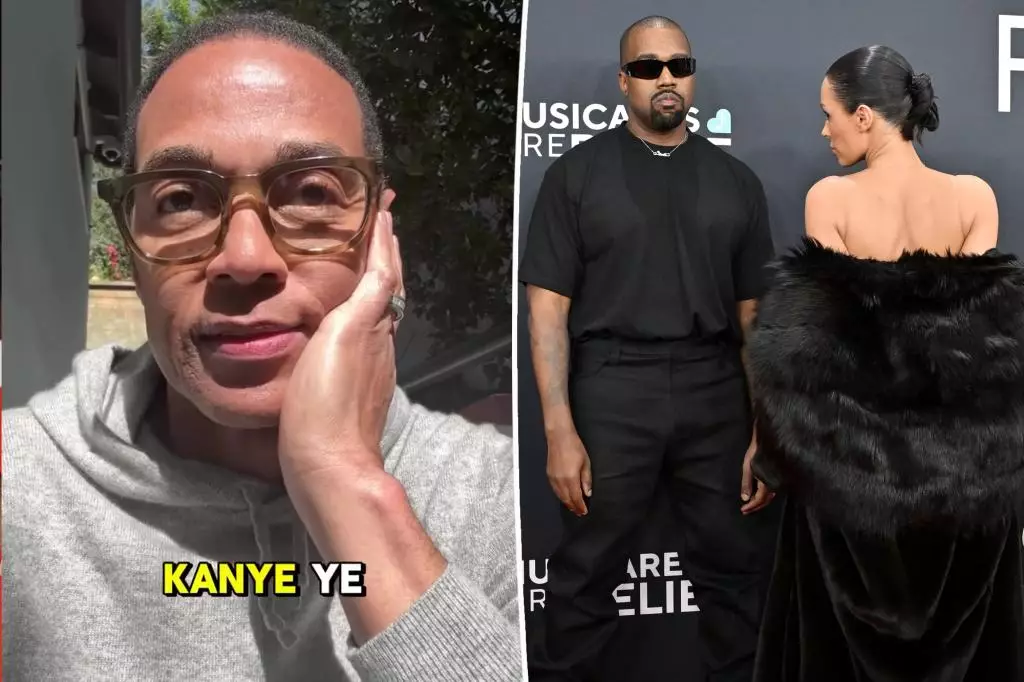Kanye West’s unpredictable antics are nothing new, but his recent conflict with CNN anchor Don Lemon has sparked conversations about respect and accountability in the public sphere. Following an eventful evening at the Grammys, where West and his new wife, Bianca Censori, stirred up headlines with their provocative fashion choices, tensions flared when West labelled Lemon as a “coon” after the broadcaster shared a rumor about them being ejected from the awards ceremony.
In today’s digital age, social media acts as a catalyst for escalating conflicts. Don Lemon’s response to West’s derogatory comment highlights the complexities of respect in a public discourse, especially among prominent figures within the Black community. In an interview with Page Six, Lemon argued that both men share a cultural heritage, and such terms should not be wielded lightly. The term “coon” carries a heavy historical burden, reflecting centuries of discrimination and internal conflict within the African American community. Lemon’s appeal for regard and dignity resonates, underscoring that respect should transcend personal grievances.
The incident exemplifies how rumors can spiral into public battles, particularly when they touch on sensitive cultural narratives. Lemon clarified that he merely disseminated information without verification, positioning himself not as an instigator but as a conduit of rumors floating in the media landscape. His attempt to navigate the situation responsibly illustrates the precarious nature of journalism, especially when discussing individuals with outsized influence—like West.
Kanye West’s reputation as a master marketer is well established. Whether through music, fashion, or publicity stunts, he knows how to garner attention. His red carpet appearance with Censori, complete with a revealing outfit, is a testament to his sacrificial flair for theatricality. Lemon described West and Censori’s appearance at the Grammys as historic, commenting on the shock factor of their nudity. The choice to bare skin was not merely about fashion but acted as a powerful statement, blurring the lines between artistry and audacity. It serves as a reminder that within the entertainment sphere, shock value often translates into visibility and conversation.
However, the backlash from the evening’s spectacle may have implications beyond just individual reactions. As Lemon noted, he wasn’t surprised by the stunt; in fact, he seemed to understand that controversy is a tool that West wields effectively. This illustrates a dichotomy within modern celebrity culture: while provocative acts can elevate one’s profile, they can also provoke harsh criticisms and misinterpretations that can affect personal and professional relationships.
In West’s Instagram post where he accused Lemon of fabricating the rumor about their Grammy exit, he inadvertently showcased the fragility of communication in a world saturated with competing narratives. Lemon’s counter-response was robust, emphasizing the need for accuracy and integrity in the kind of stories that are often sensationalized in the media. By stating, “I actually corrected it,” Lemon tried to underscore his role as a responsible journalist. Such an exchange illustrates a critical truth: miscommunication can wreak havoc, particularly between public figures who are constantly scrutinized by their fan bases and the media.
Furthermore, the public’s reaction to this tumultuous exchange has transformative potential, as it urges conversations around accountability. Lemon’s critique of West coalesces with broader patterns of expectations placed on public figures, not just to entertain but to operate with a sense of social responsibility. These tensions highlight how problematic public exchanges can shape reputations, influence industry expectations, and potentially alter public perceptions of race and professionalism.
The duel between Don Lemon and Kanye West at the Grammys encapsulates an array of themes—from the complexity of respectful dialogue among Black men, the allure of controversy within celebrity culture, to the ramifications of misunderstandings on public platforms. It serves as a reminder that respect must go both ways. As these conversations unfold, we can only hope that it leads to greater clarity and accountability for public figures who shape discourse and narrative in socially charged environments. Ultimately, such encounters can illuminate the need for constructive dialogue, challenging all parties to rise above personal attacks in favor of cultivating understanding and mutual respect.

